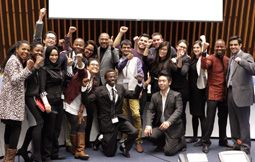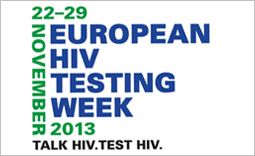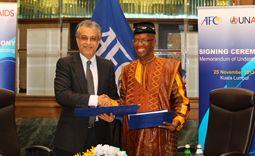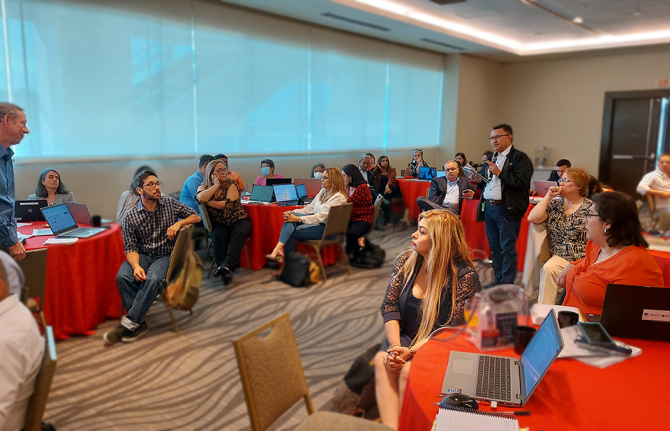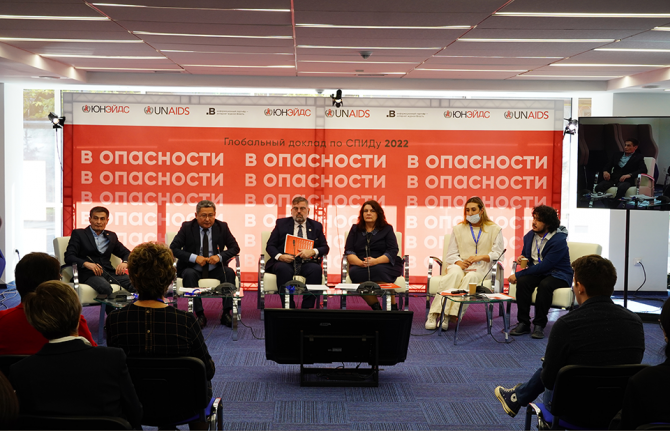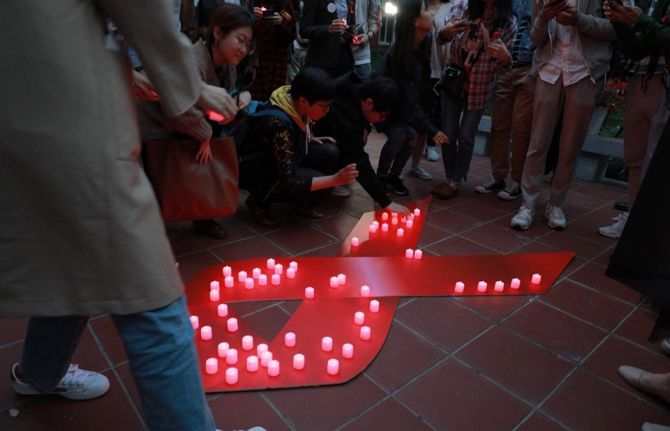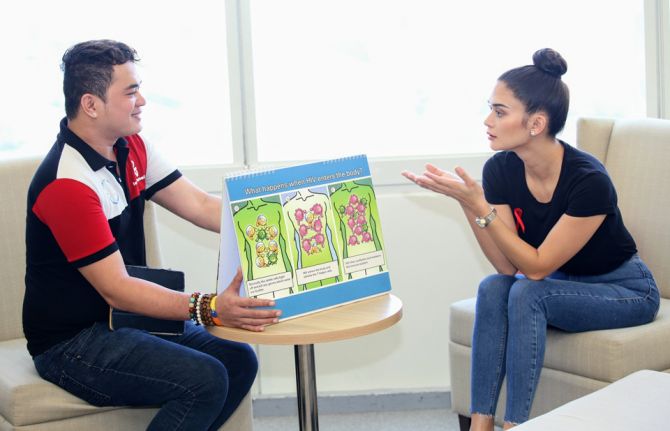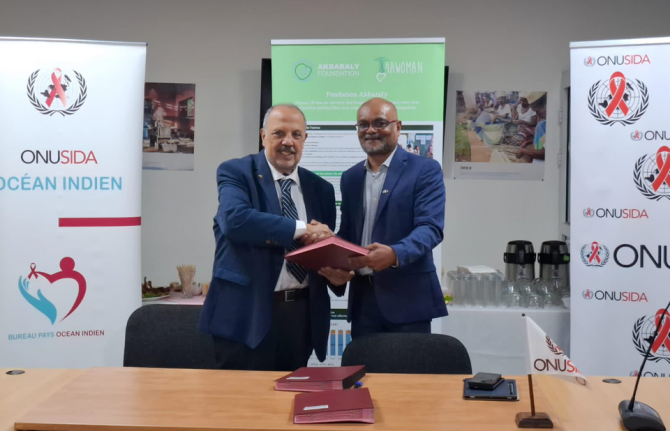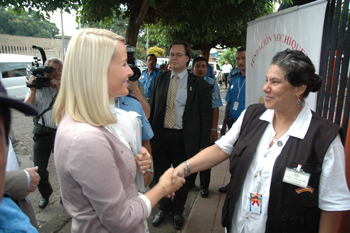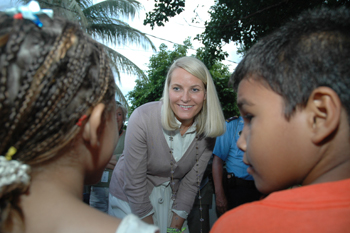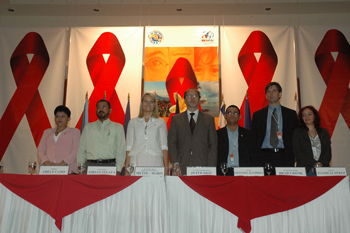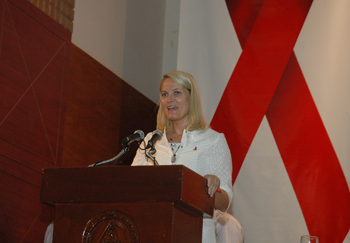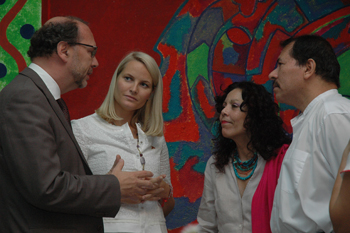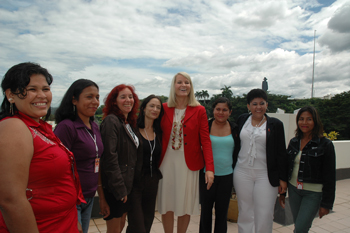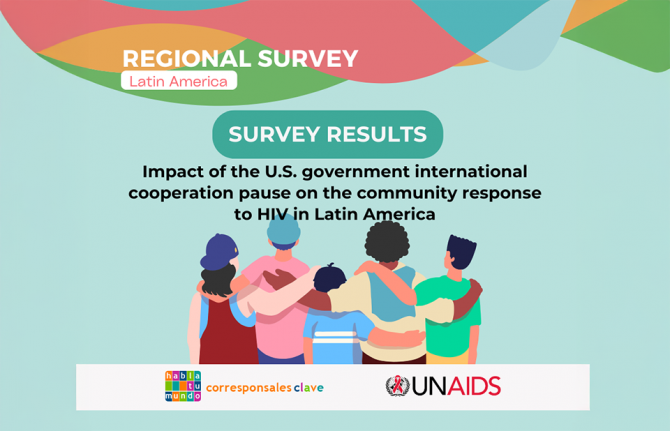
Feature Story
UN Special Envoy speaks out on violence against women
26 November 2007
26 November 2007 26 November 2007
Approximately 60% of HIV adults living with HIV in
sub-Saharan Africa are women.
Photo credit: UNAIDS/L.Taylor
In a special statement to mark International Day Against Violence Against Women and the start of the annual ‘16 days of Activism Against Gender Violence’ (November 25), the UN Secretary General’s Special Envoy on AIDS for Africa, Elizabeth Mataka, asks ‘ when it comes to women, why are we so slow to act?’
“I have been reflecting on exactly what ‘violence’ in the violence against women means. The more I thought about the subject, the more I realized that violence now has many shapes and colours, it has transcended the violence of physical, sexual and psychological assault, touched down on political and economic harm and now moved into the space of complicity by silence,” Ms Mataka said.
Highlighting the recent epidemiological data released by UNAIDS and WHO, Ms Mataka underlined that approximately 60% of HIV adults living with HIV in sub-Saharan Africa are women. “This information, I am aware, is not new – women in our region have for many years been what has been coined ‘the face of the epidemic’ - but what this new data has done is brought home the realization that nothing, nothing has changed for women. When it comes to women, why are we so slow to act? “ she said.
“With statistics such as these, we are facing a critical emergency, we are rapidly moving towards an Africa without women. Allowing this to happen is violence against women. You may not conduct a physical assault, but being silent is being complicit and non-action is now a violent act,” she added.
The 16 Days of Activism Against Gender Violence is an international campaign that was started by the Center for Women's Global Leadership (CWGL) in 1991. The 16 Days runs from November 25, International Day Against Violence Against Women to December 10, International Human Rights Day to symbolically link violence against women and human rights and to emphasize that such violence is a violation of human rights.
This 16-day period also highlights other significant dates including December 1— World AIDS Day.
Links:
Read the full statement by Elizabeth Mataka
Read more on International Day Against Violence Against Women on the UNIFEM web site
Related

Feature Story
AIDS on the agenda at Commonwealth Heads meeting
26 November 2007
26 November 2007 26 November 2007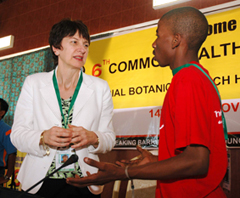
UNAIDS Deputy Executive Director Ms Deborah
Landey talking with the Commonwealth Youth
Delegate from Botswana Thata Kebadire. Entebbe
Uganda.17 November 2007.
The need to further engage young people in the AIDS response was a key element of discussion at the recent Commonwealth Heads of Governments Meeting (GHOGM), which took place in Kampala, Uganda.
UNAIDS Deputy Executive Director Deborah Landey joined Uganda AIDS Commission Director General Dr David Kihumuro Apuuli and youth representatives Johnah Josiah of Kenya and Mobafa Baker of Trinidad in a plenary session at the meeting, focusing on the health of young people. During her intervention, Ms Landey discussed the importance of engaging young people in the HIV response.
The Commonwealth Heads of Government Meeting is a biennial meeting convening representatives from 53 member states. The commitment to young people played a significant part in this year’s meeting, which was officially opened by the Head of the Commonwealth, Her Majesty Queen Elizabeth II.
Deborah Landey took part in the meeting as part of a country visit to Uganda where she also met with various leaders in Uganda’s AIDS response from government and civil society.
Links:
Read UNAIDS Deputy Executive Director's speech
View photo gallery of UNAIDS Deputy Executive Director's visit
Visit the CHOGM 2007 Uganda Web site
Related

Feature Story
International consultation on AIDS estimates: Recommendations
16 November 2007
16 November 2007 16 November 2007An International Consultation on AIDS Epidemiological Estimates, convened jointly by the UNAIDS Secretariat and WHO, was held on 14-15 November 2007 in Geneva, Switzerland. The meeting brought together more than 30 technical experts and country epidemiologists from around the world to review the current processes and methodologies used by UNAIDS and WHO to produce HIV estimates at the country, regional and global level.
The consultation recognised that the new set of draft UNAIDS/WHO country estimates for 2007 is based on the best available data and methodologies.
The meeting participants made a number of recommendations for future improvements. These included:
- Independent scientific review of the estimation process and methodologies should take place on a regular basis, involving experts who have not been directly implicated in the production of the methodologies and the estimates;
- Countries should be encouraged to collect data of better quality and representativeness and increased assistance should be provided to countries. Data should come from a range of sources, such as sentinel surveillance sites, as well as population-based surveys, though careful consideration must be given to the strengths and limitations of each data source (for example non response bias in surveys). Surveillance of most at risk populations, such as sex workers, injecting drug users and men who have sex with men, must be strengthened to try to reach more accurate estimates of population sizes and HIV prevalence;
- Country ownership should continue to be a key feature of HIV surveillance and data collection, with training involving a wide range of stakeholders including local epidemiologists, civil society and government representatives;
- Surveillance should be integral to the design, implementation and evaluation of HIV programmes in country. UNAIDS and WHO should build capacity of country counterparts to analyse surveillance data leading to an improved understanding of the dynamics of the epidemic and how programmatic resources might be best used; and
- Special studies may be required to assess aspects such as AIDS-specific mortality rates and the quality and coverage of treatment resources.
The UNAIDS secretariat and WHO will release the global 2007 HIV estimates on 21 November 2007 in time for World AIDS Day. UNAIDS and WHO will continue to work with experts and country counterparts to systematically review the methods used to derive HIV estimates and ensure they reflect up to date scientific evidence and research.
Links:
Read more on the process behind AIDS estimates
Read more on the International consultation on AIDS estimates
Related
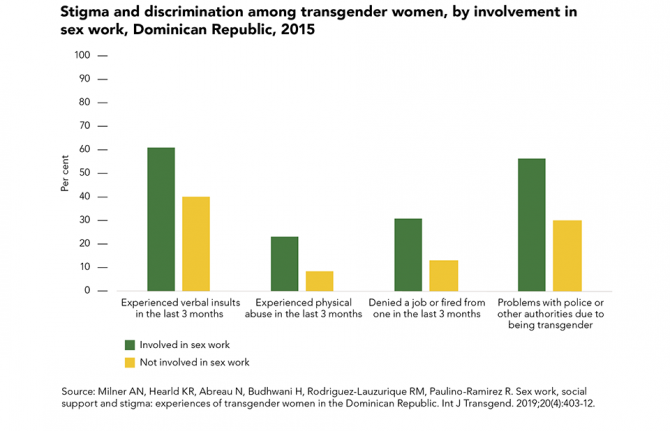 Transgender sex workers face frequent abuse
Transgender sex workers face frequent abuse

29 March 2022

Feature Story
International consultation on AIDS estimates
13 November 2007
13 November 2007 13 November 2007
Over the last eight years, estimates of HIV prevalence, incidence and mortality have been produced in close collaboration with countries, using methods developed by a reference group of internationally renowned scientists.
In producing these estimates, the UNAIDS Secretariat and WHO use the best available data and latest analytic methods. As this data improves the estimates are revised, sometimes significantly.
In July 2007, India announced revised estimates of HIV prevalence and the number of people living with HIV that were less than half the previous estimates. New regional and global estimates being prepared for release in the 2007 AIDS Epidemic Update report are expected to include further downward revisions in some countries.
In the light of these changes, UNAIDS felt that it was timely that an independent and authoritative review of the process for AIDS estimates is carried out. With this in mind, UNAIDS is bringing together a group of some 30international experts and country practitioners to review the methods and process used to generate AIDS data.
The consultation is being held on the 14-15 of November at the UNAIDS Secretariat headquarters in Geneva. The objectives of the meeting are to review the current methodology used by the UNAIDS Secretariat and WHO and to look at ways to improve the methodology and its application in producing AIDS estimates. As part of the consultation, representatives from a number of countries will provide country perspective on country methods and process and how this is linked to the UNAIDS/WHO process.
At the end of the meeting, a report will be drafted containing the findings of the review and recommendations for improvement of the process for development and use of methods. As in previous years, UNAIDS Secretariat and WHO will be releasing the latest estimates on the epidemic, for 2007, in time for World AIDS Day on December 1st.
UNAIDS and WHO will continue to systematically review the methodology used to ensure that the methods used to analyze data are the best to our knowledge and will modify AIDS estimates when new scientific data, research and analysis supports such change.
Links:
Read more on the process behind AIDS estimates
Related
 Transgender sex workers face frequent abuse
Transgender sex workers face frequent abuse

29 March 2022

Feature Story
Gearing up for World AIDS Day 2007
13 November 2007
13 November 2007 13 November 2007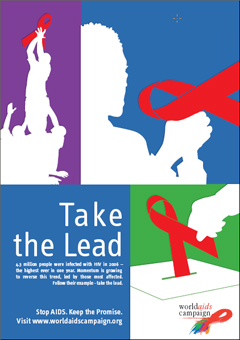
This year, World AIDS Day—that takes place
on December 1— will focus on leadership, the
theme set by the World AIDS Campaign under the
five-year slogan “Stop AIDS, Keep the Promise”.
With less than a month to go before this year's World AIDS Day, events to commemorate the day are being organized all over the world. This year, World AIDS Day—that takes place on December 1— will focus on leadership, the theme set by the World AIDS Campaign under the five-year slogan “Stop AIDS, Keep the Promise”.
World AIDS Day is a day when people from around the world come together within a single effort to raise awareness about HIV and to express global solidarity with people living with HIV. But World AIDS day is not just about raising awareness. It also provides a global opportunity to urge governments and leaders for all promises on AIDS to be kept as well as an opportunity to demonstrate commitment and action on AIDS.
In designating leadership as the World AIDS Day theme for the next two years (2007 – 2008), the World AIDS Campaign highlights both the political leadership needed to fulfill commitments that have been made in the response to AIDS – particularly the promise of universal access to treatment, prevention, care and support – and celebrating the leadership that has been witnessed at all levels of society.
In preparation for this year’s World AIDS Day, the World AIDS Campaign has produced a wide range of new materials to be used by people and organizations that want to set up their own events on World AIDS Day. These materials are available on the World AIDS Campaign Web site. World AIDS Campaign materials are intended to provide organizations who have limited resources with access to meaningful campaigning materials as well as enhancing solidarity within the global response to AIDS by working through a united effort.
The materials available consist of posters, leaflets and CD-ROMs in a number of languages, including French, Spanish, Russian, Swahili and English. Other language versions, particularly African languages, are also offered via electronic distribution. The printed posters and CD-ROMs can also be ordered from the World AIDS Campaign web site.
The web site also has a calendar of events where more and more organizations are now listing information on their planned activities for World AIDS Day so people can browse the different events planned in their country or region.
For the 2007 celebrations, the World AIDS Campaign has also produced, in collaboration with UNAIDS, a public service announcement on this year’s leadership theme that is being distributed to promote the day and/or can be shown during events.
UNAIDS founded the World AIDS Campaign originally as a loose partnership of UN agencies, governments and all sectors of civil society to campaign around specific themes related to AIDS. The World AIDS campaign is now an independent NGO based in Amsterdam, the Netherlands, and is governed by a Global Steering Committee of global constituency-based AIDS networks comprised of the Global Network of People Living with HIV/AIDS, the International Community of Women Living with HIV/AIDS, the Youth Coalition, the Global Unions Programme on HIV/AIDS, the International Council of AIDS Service Organizations, the Ecumenical Advocacy Alliance, and the International Women’s AIDS Caucus. UNAIDS and the Global Fund to Fight AIDS, TB and Malaria are non-voting members.
Links:
Visit the World AIDS Campaign web site
Related
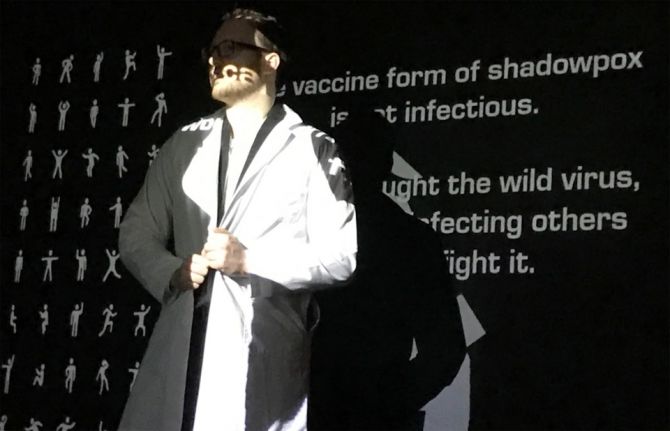 Immune Nations
Immune Nations

23 May 2017

Feature Story
News highlights from the 38th World Lung Health conference
12 November 2007
12 November 2007 12 November 2007All stories featured here below were written by NAM and housed on the NAM web site.
200,000 die each year because world still failing to treat HIV and TB together
HIV programmes are still failing to integrate TB prevention and care into their work, and TB remains the biggest killer among HIV-positive people as a result, experts and advocates said on the opening day of the 38 th World Lung Health conference in Cape Town.
“If we screened all people living with HIV for TB, we could save thousands of lives,” said Dr Alasdair Reid, TB/HIV Liaison at UNAIDS.
To read the full news report, go to http://www.aidsmap.com/en/news/EB1B111D-F861-4F76-8AA1-40FD572044D8.asp
Focus on MDR TB threat
The growing problem of multi-drug resistant (MDR) tuberculosis threatens to derail TB control efforts unless there is greater investment in control and diagnosis, TB experts warned this week in the run-up to the 38 th World Lung Health conference, which opened on Friday in Cape Town, South Africa.
This year’s conference is taking place in South Africa in order to highlight the growing challenge of drug-resistant tuberculosis in the regions of the world most seriously affected by HIV.
Last year’s discovery of an outbreak of extensively drug-resistant TB among HIV-positive patients in the rural KwaZulu Natal town of Tugela Ferry rocked the worlds of TB and HIV treatment, and highlighted the need for greater integration of TB and HIV care.
“XDR TB is a wake-up call to ensure a better future of HIV treatment by strengthening TB control,” said Dr Haileyesus Getahun of the World Health Organization Stop TB department, speaking at a workshop on XDR and MDR TB in the context of HIV, organised by the Treatment Action Group and the Stop TB Partnership.
To read an extended report on MDR and XDR TB from the 38 th World Lung Health Conference in Cape Town, go to http://www.aidsmap.com/en/news/40A6BE12-72BC-4B9E-ACBE-9348DD330091.asp
Key scientific findings from the conference:
Tugela Ferry XDR TB outbreak continues to grow
Two hundred and sixty-six people in the South African town of Tugela Ferry have now been diagnosed with XDR TB in the world’s largest outbreak of extensively drug-resistant TB. A further 205 cases of MDR have also been discovered, and eight staff at the Church of Scotland Hospital, Tugela Ferry, have died of MDR or XDR TB. Eight-four per cent of all XDR TB patients have died, Dr Tony Moll reported.
Southern Africa becoming MDR hot-spot
Re-analysis of MDR TB reports by Dr Ruth McNerney of the London School of Hygiene, using available data, shows that ten out of 20 regions with the highest incidence of MDR TB per 100,000 inhabitants are in southern Africa, and eight of ten are in South Africa. The highest incidence was found in the Karakalpakistan district of Uzbekistan (35 cases per 100,000), with Kazakhstan ranked second (22 per 100,000), and four provinces of South Africa (Limpopo, North-West, Mpumalanga and KwaZulu-Natal) reported 1 – 15 cases per 100,000 notifications.
Dr McNerney noted that although MDR TB cases comprised a low proportion of total TB cases in the region, the population incidence was nevertheless high.
MDR TB risk elevated in HIV-positive TB cases in Ukraine
An analysis of all TB cases in the southern Ukraine district of Donetsk, a large industrial city also seriously affected by HIV, has found that among 1293 consecutive TB patients diagnosed smear-positive between July 2005 and June 2006, 15.5% of those diagnosed with TB for the first-time had MDR TB. Among those previously treated for TB, 41.5% had multi-drug resistant TB.
The Ukrainian researchers found that 21% of their TB patients were HIV-positive, and that the rate of MDR TB was significantly higher in HIV-positive patients, who had a 50% higher risk of being diagnosed with MDR TB as their first TB infection.
Intensified case finding of TB cases in people with HIV: look for multiple symptoms
Studies from Cambodia and Ethiopia suggest that encouraging health providers to look for a range of symptoms, rather than just cough, may yield a higher rate of TB case identification in HIV-positive people.
Research in Cambodia reported by Dr Michael Kimerling and Dr Kevin Corn found that a cough lasting three weeks was a less sensitive predictor of TB than prolonged fever and sudden weight loss within the previous month, while research in Ethiopia found that screening only for cough would miss 56% of cases in HIV-positive people.
Current WHO guidelines for identification of smear-negative TB (which is more common in HIV-positive people) recommend looking for a number of symptoms, including cough, prolonged fever, weight loss, night sweats and swollen lymph nodes. Symptoms other than cough may be particularly important indicators of TB in patients with extrapulmonary TB (outside the lungs), which is also more common in HIV-positive people.
MDR death rates lowest in South Africa where patient-centred approaches followed
Patients in the North-West province of South Africa have the lowest risk of death from MDR TB when compared to the rest of the country, probably due to a patient-centred treatment approach, a national survey has found. Incentives such as nutritional support, transport to visit the MDR treatment centre after follow-up, a dedicated transport network for MDR patients and active follow-up for defaulters resulted in a 9.5-fold lower risk of death compared with Eastern Cape province, and 4.2-fold lower risk of death compared to Gauteng.
HIV-positive MDR patients, regardless of their location in South Africa, were 3.6 times more likely to die, and those with ofloxacin resistance 4.2 times more likely to die. All differences were statistically significant.
Link:
Read more on the conference
Visit the oficial web site
Related

Feature Story
Princess Stephanie of Monaco visits Madagascar
09 November 2007
09 November 2007 09 November 2007
L to R: Mme Setou Kaba, UNAIDS Country
Coordinator, Sarah Ravalomanana, daughter of the
president of Madagascar, HSH Princess Stephanie,
Mr. Marc Ravalomanana, President of Madagascar,
M. Fenosoa Ratsimanetrimanana, Secretaire
Executive of the National AIDS Council (SE/CNLS),
and UN Resident Coordinator Dr. Xavier Robert Marie
Leus.
UNAIDS Special Representative HSH Princess Stephanie of Monaco visited Madagascar to raise awareness around HIV-related stigma and discrimination. The visit was the first in her role as UNAIDS Special Representative and she met with a number of different groups and organisations working on AIDS issues in the country.
Appointed UNAIDS Special Representative in October 2006, the Princess is a keen advocate for AIDS issues and has been President of the Monegasque association ‘Fight AIDS Monaco’ since 2004. Fight AIDS Monaco is a group that works primarily on disseminating accurate information about HIV, HIV prevention issues and providing support to people living with and affected by HIV.
During her trip to Madagascar, the Princess took the opportunity to visit some of the projects funded by Fight AIDS Monaco and pledged to continue to support their work.
She also visited several hospitals and centres that offer voluntary counselling and testing services. At one of the centres, the Municipal Bureau of Hygiene, she spoke with staff to learn more about how voluntary counselling and testing is integrated in the wider hospital services.
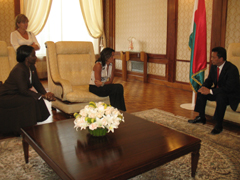
At the presidential palace (Iavoloha) the Princess
met with the President of Madagascar Marc
Ravalomanana and Mme Setou, UNAIDS Country
Coordinator.
She also met with the President and members of “Finoana Fanantenana Fitiavana” which translates as “belief, hope and love”, and is an association of people living with HIV housed within the Bureau of Hygiene. The association is the first in Madagascar to provide psychosocial support to people living with HIV and has served as a model for the 23 other associations now offering similar services across Madagascar. The President explained to the Princess how the association supports its members to live positively with HIV despite the daily challenges they face and the fears that many people have in living openly with HIV.
At the Befelatanana Joseh Raseta hospital, the Princess met with medical staff engaged in providing nutritional support and care for people living with HIV through an emergency fund. The fund finances nutrition for patients who are unable to pay for themselves. The Princess encouraged the initiative and the efforts already demonstrated by the hospital and ensured her continued support through her association “Fight AIDS Monaco”.
The Princess also visited Sambatra Izay Salama, a local non-governmental organisation providing support to people living with HIV. She was invited to observe various activities at the centre including a session on education and information for commercial sex workers and voluntary testing and counselling activities.
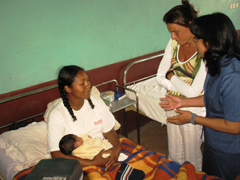
HSH Princess Stephanie visited a district health
centre which offers PMTCT serices and which has
benefited from donations from “fight aids Monaco”
to refurbish the hospital to improve its services.
The Princess met with the director of the hospital
and visited women at the maternity ward.
One of the Princesses’ main areas of interest is working with children and learning more about how they become vulnerable to HIV infection. At the Grain de Bitume center - an association working on re-socializing street children and children who have been abused – she had the opportunity to play with the children and enjoy a circus performance they organized in honour of her visit. The efforts of the association contribute to reduce the vulnerability of the children to HIV.
Focusing on sharing key messages related to reducing stigma and discrimination, the Princess met with national and local leaders involved in the national AIDS response. This included discussions with the President of the Republic Mr. Marc Ravalomanana, who is personally engaged in the response to AIDS, and M. Fenosoa Ratsimanetrimanana, Executive Secretary of the National AIDS Council and who coordinates the national response to AIDS in Madagascar. The Princess congratulated the President for his engagement in the response to AIDS and remarked that the high level of investment in HIV prevention programmes is a great example which many countries will surely look to.
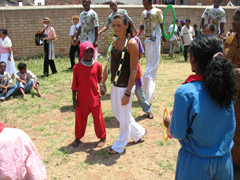
At the Grain de Bitume center - an association
working on re-socializing street children and children
who have been abused – the Princess had the
opportunity to play with the children and enjoy a
circus performance
The Princess set aside time to discuss directly with representatives from civil society and local associations of commercial sex workers, people living with HIV and groups of men who have sex with men. They shared their experiences on how stigma and discrimination affects their daily life. The princess gave words of support and encouragement, recognizing the impact stigma is having on their lives, and urged that we fight discrimination together by making correct information about HIV available in order to educate those that discriminate in society as stigma and discrimination is usually a result of ignorance.
She recognized the difficulty they faced in sharing their experiences and living openly with HIV, and that people who take that step often risk loosing their employment and encountering negative reactions from family and friends.
All the participants agreed that working together as partners in the response was the best way to try to overcome the problems related to stigma and discrimination in Madagascar.
Links:
Read more on UNAIDS Special Representative HSH Princess Stephanie of Monaco
Visit the Fight AIDS Monaco Web site

Feature Story
38 th Union World Conference on Lung Health
09 November 2007
09 November 2007 09 November 2007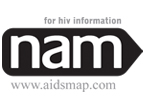
News highlights from the 38th World Lung Health Conference
UNAIDS is working in partnership with NAM to provide news reports on key scientific findings and other important developments from the 38th World Lung Health Conference, taking place in Cape Town, South Africa from 8-12 November.
NAM is a UK-based HIV information provider and is the publisher of the HIV information website www.aidsmap.com and the electronic newsletter HIV & AIDS Treatment in Practice.
Read more
Visit nam's web site
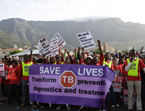
Global advocates march for TB investment
Around 5000 activists from around the world marched through Cape Town on Thursday, calling for greater global investment in TB research and programmes. The marchers, led by Zackie Achmat of the Treatment Action Campaign, delivered a petition to the organisers of the World Conference on Lung Health. Despite the fact that it is mostly preventable and treatable, TB remains the greatest cause of illness and death in people living with HIV. The marchers were calling attention to slow progress in research and development of new TB medicines and diagnostics -- there have been no new TB drugs for more than 40 years and the only test for TB, which is over 100 years old, is unreliable, especially in diagnosing TB in people living with HIV.
The theme for the conference, which opens in Cape Town today, is 'Confronting the challenges of HIV and multi-drug resistance in TB prevention and care'. The march was co-organised by Treatment Action Campaign, the AIDS Law Project, the AIDS and Rights Alliance of Southern Africa.

Major TB Conference focuses on HIV
More than 3,000 delegates are expected to attend the main annual conference on tuberculosis, which started Thursday in Cape Town, South Africa. This year’s theme for the 38th Union World Conference on Lung Health is "Confronting the challenges of HIV and Multi-Drug Resistance in TB prevention and care”. In addition to the focus on HIV, the conference will also deal with other key international lung health-related issues, such as tobacco control, child lung health and asthma. Read more
38 th Union World Conference on Lung Health
Related

Feature Story
Major TB Conference focuses on HIV
08 November 2007
08 November 2007 08 November 2007
This year’s theme for the 38 th Union
World Conference on Lung Health is
"Confronting the challenges of HIV
and Multi-Drug Resistance in TB
prevention and care”.
Photo credit: P. Virot
More than 3,000 delegates are expected to attend the main annual conference on tuberculosis, which starts today in Cape Town , South Africa . This year’s theme for the 38 th Union World Conference on Lung Health is "Confronting the challenges of HIV and Multi-Drug Resistance in TB prevention and care”. In addition to the focus on HIV, the conference will also deal with other key international lung health-related issues, such as tobacco control, child lung health and asthma.
It is particularly fitting that this year’s conference, with its emphasis on HIV and TB co-infection, is being held in South Africa, a country that is working to deal the medical, health, social and economic consequences of HIV and TB co-infection, in the face of resource constraints and other serious challenges.
The conference is organized by the International Union Against Tuberculosis and Lung Disease and runs through Monday 12 November. Regular reports from the conference, developed in collaboration with Aidsmap, will be posted on the UNAIDS website.
Links:
Visit the conference web site
Go to Aidsmap’s guide to TB and HIV
Visit WHO’s tuberculosis web site
Related

Feature Story
HRH and UNAIDS Special Representative, the Crown Princess of Norway at CONCASIDA
08 November 2007
08 November 2007 08 November 2007As part of an official visit to Nicaragua to learn more about the impact AIDS is having on women, UNAIDS Special Representative, HRH the Crown Princess of Norway visited a grassroots AIDS organisation working on issues of human rights and the sexual and reproductive rights of women and children.
The visit was part of a four-day advocacy mission to the region for the Crown Princess during which she will be engaging with different groups and individuals involved in the AIDS response and participating in events organised at the 5th Central American Congress on AIDS (CONCASIDA).
|
|
HRH and UNAIDS Special Representative, the Crown Princess Mette-Marit of Norway during her arrival to the Xochiquetzal Foundation with the Director of the organization, Mrs. Hazel Fonseca. |
|
|
HRH and UNAIDS Special Representative, the Crown Princess Mette-Marit of Norway sharing with children of the San Jose Oriental Neighborhood during her field visit to the Xochiquetzal Foundation. |
|
|
UNAIDS Executive Director, Dr. Peter Piot and HRH and UNAIDS Special Representative, the Crown Princess Mette-Marit amongst other Officials who participate in opening event of the V Central American Meeting of people living with HIV that took place in Managua as part of the 5th Central American Congress on HIV (CONCASIDA). |
|
|
HRH and UNAIDS Special Representative, the Crown Princess Mette-Marit of Norway, during her speech at the official closing session of the V Meeting of People living with HIV in Managua, Nicaragua. 4 – 9 November 2007. |
|
|
From L to R: UNAIDS Executive Director, Dr. Peter Piot, HRH and UNAIDS Special Representative, the Crown Princess Mette-Marit of Norway, Mrs. Rosario Murillo, Nicaraguan First Lady and Nicaraguan President, Daniel Ortega, during a private meeting in Managua, Nicaragua, in which they share suggestions on the improvement of the HIV response in the Central American region. Nicaragua 4 – 9 November 2007. |
|
|
HRH and UNAIDS Special Representative, the Crown Princess Mette-Marit of Norway during her encounter with ASONVIHSIDA (Nicaragua organization of people living with HIV) leaders. |

